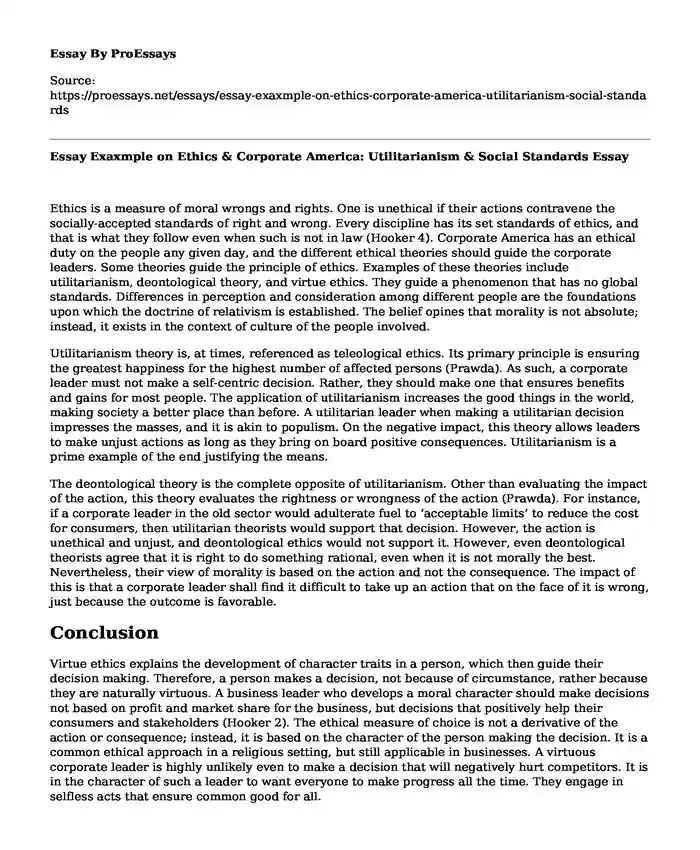Ethics is a measure of moral wrongs and rights. One is unethical if their actions contravene the socially-accepted standards of right and wrong. Every discipline has its set standards of ethics, and that is what they follow even when such is not in law (Hooker 4). Corporate America has an ethical duty on the people any given day, and the different ethical theories should guide the corporate leaders. Some theories guide the principle of ethics. Examples of these theories include utilitarianism, deontological theory, and virtue ethics. They guide a phenomenon that has no global standards. Differences in perception and consideration among different people are the foundations upon which the doctrine of relativism is established. The belief opines that morality is not absolute; instead, it exists in the context of culture of the people involved.
Utilitarianism theory is, at times, referenced as teleological ethics. Its primary principle is ensuring the greatest happiness for the highest number of affected persons (Prawda). As such, a corporate leader must not make a self-centric decision. Rather, they should make one that ensures benefits and gains for most people. The application of utilitarianism increases the good things in the world, making society a better place than before. A utilitarian leader when making a utilitarian decision impresses the masses, and it is akin to populism. On the negative impact, this theory allows leaders to make unjust actions as long as they bring on board positive consequences. Utilitarianism is a prime example of the end justifying the means.
The deontological theory is the complete opposite of utilitarianism. Other than evaluating the impact of the action, this theory evaluates the rightness or wrongness of the action (Prawda). For instance, if a corporate leader in the old sector would adulterate fuel to ‘acceptable limits’ to reduce the cost for consumers, then utilitarian theorists would support that decision. However, the action is unethical and unjust, and deontological ethics would not support it. However, even deontological theorists agree that it is right to do something rational, even when it is not morally the best. Nevertheless, their view of morality is based on the action and not the consequence. The impact of this is that a corporate leader shall find it difficult to take up an action that on the face of it is wrong, just because the outcome is favorable.
Conclusion
Virtue ethics explains the development of character traits in a person, which then guide their decision making. Therefore, a person makes a decision, not because of circumstance, rather because they are naturally virtuous. A business leader who develops a moral character should make decisions not based on profit and market share for the business, but decisions that positively help their consumers and stakeholders (Hooker 2). The ethical measure of choice is not a derivative of the action or consequence; instead, it is based on the character of the person making the decision. It is a common ethical approach in a religious setting, but still applicable in businesses. A virtuous corporate leader is highly unlikely even to make a decision that will negatively hurt competitors. It is in the character of such a leader to want everyone to make progress all the time. They engage in selfless acts that ensure common good for all.
Works Cited
Hooker, John. Why Business Ethics. 1st ed., Carnegie Mellon University, 2003, pp. 1-7, Accessed 21 June 2020.
Prawda, Gale. "30 » Philodialogue.Com". Philodialogue.Com, 2020, http://philodialogue.com/30-2/. Accessed 21 June 2020
Cite this page
Essay Exaxmple on Ethics & Corporate America: Utilitarianism & Social Standards. (2023, Sep 10). Retrieved from https://proessays.net/essays/essay-exaxmple-on-ethics-corporate-america-utilitarianism-social-standards
If you are the original author of this essay and no longer wish to have it published on the ProEssays website, please click below to request its removal:
- Working In the Interior Ministry - Admission Essay
- Does an Increase in Wage Motivate Workers to Work Harder?
- External Auditors That Don't Doing Quality Audit Work Articles Review
- Personal Opinion Related to Recommendation on Nursing
- Organizational Behavior and Motivation Paper Example
- Ethical Values and Challenges in Decision Making Paper Example
- Essay Example on Exploring the Relationship Between Euthyphro's Piety and DCT Ethics







